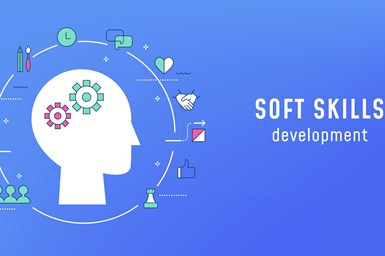Leadership is more about soft skills — the ability to inspire, persuade, guide, sway and communicate in a way that’s “heard” rather than just “listened to” — than it is about being the best relative to hard skills.
In many ways, being an effective leader boils down to your ability to influence people: a proficiency that is driven by one’s emotional intelligence quotient (EQ). Instead of being about the best relative to hard skills, leadership is more about soft skills — the ability to inspire, persuade, guide, sway and communicate in a way that’s “heard” rather than just “listened to.” As a leader, if you do not understand your team’s motivations and feelings, you will never be able to establish an optimally functioning team and reap the copious rewards related thereto. The result is needless opportunity loss.
“If you are to lead with maximum efficacy, you must build an enthusiastic following,” says Andrew Wyatt, leadership coach and author of “Pro Leadership: Establishing Your Credibility, Building Your Following and Leading With Impact.” “This requires relational and people skills as well as all of the related soft skills that contribute to one’s EQ. And a leader cannot staff EQ out. You must have it yourself. Those who don’t will need to develop it to realize truer and more unencumbered success.”
According to Wyatt, the good news is that everyone can develop their EQ. Unlike IQ, which pretty much is what it is, EQ can be nurtured, developed and increased. Here are a few excerpted insights from Wyatt’s book on developing leadership EQ, both in an organization and within oneself.
Setting an EQ standard starts where every other cultural development begins, which is with leadership. Based on the principle in the last chapter, to develop a culture-wide EQ, we need to start with ourselves, beginning with our attitudes toward the people we are leading. As humans, we naturally favor ourselves. That means if I am an EQ-dominant person, I will naturally be drawn to other EQ-dominant people. The same is true for the IQ-dominant person. This is fine for friendships. However, favoring one trait over the other in an organization will create a culture of favoritism, resulting in dysfunction caused by this imbalance. As the leader, it is critical to not have favorites, while having the ability to defend both camps.
Developing EQ among a leadership team is a necessary activity of pro leadership. These leaders realize they cannot succeed alone. As leadership expert John Maxwell, says, “If you want to go fast, go alone; if you want to go far, go with others.” The extent to which a leader fosters EQ among the members of his/her inner circle is the extent to how far the leadership team will go. To do this as a leader, one must start at the same place as with your cultural EQ: attitude. Leadership development of any type is a process, not a destination. It is a journey that never ends. When one stops developing, he/she stops growing.
No matter what one’s EQ level is, ongoing personal development is always important. It is necessary to read a lot about the topic and consider working with a coach. Also, join a peer group or start one. It is true that iron sharpens iron. Developing EQ is not a solo sport, so we should work together. Leadership is a lonely business; everyone needs someone to talk to and a safe environment to share thoughts. We also need people who will tell us the last 10% — that bit of information most people will not share.
“IQ builds products, but EQ builds companies and followings. So, as you step out today to lead, let your EQ lead the way,” Wyatt says. “Develop your EQ, your culture’s, your team’s and your own. Do so and you will have taken a big step in developing your following and your pro leadership abilities, putting yourself in a prime position to be able to motivate the people you lead.”
About the Author
Merilee Kern
Forbes Business Council and Newsweek Expert Forum member, Merilee Kern, MBA, is a brand analyst, strategist and futurist. As a prolific branding and marketplace trends pundit as well as host of the “Savvy Ventures” (FOX Business & Bloomberg) and “Savvy Living” lifestyle and travel TV shows, Kern reports on titans of industry: change makers, movers, shakers and innovators across all categories, both B2C and B2B.
Read Next
How Emotional Intelligence Helps Sustain a Workforce — Part 2
The lack of available skilled workers is an ongoing issue. A leader with Emotional Intelligence can leverage those skills to keep the workers they have.
Read MoreHow Emotional Intelligence Helps Sustain a Workforce — Part 1
The lack of available skilled workers is an ongoing issue. It’s easier to keep a good employee than to find one. A leader can leverage Emotional Intelligence skills to keep the workers they have.
Read MoreSeeing Automated Workpiece Measurement in Real Time
User-friendly inspection software for CNC machining centers was shown at IMTS 2024 monitoring measurements between and after machining while performing SPC based on recorded measurement values.
Read More






.jpg;maxWidth=300;quality=90)










